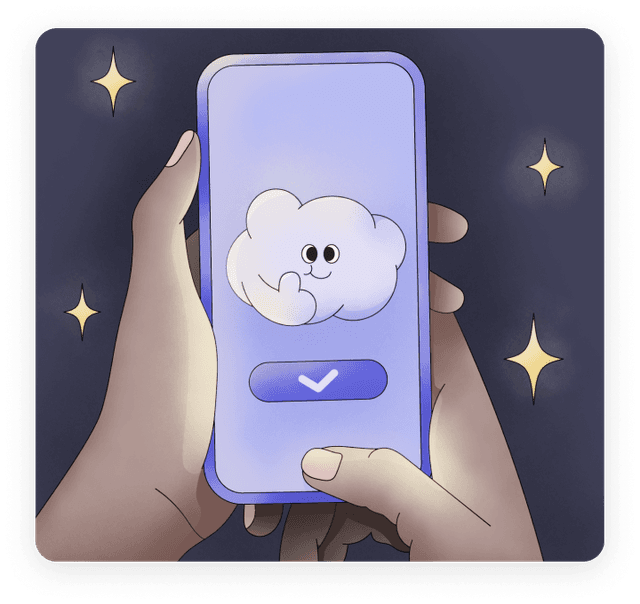
Denys Chumak
02 Mar 2024
10 Psychological Facts About Dreams You Probably Didn't Know About
Did you know that your day has an impact on your dreams? It is possible to argue that dreams are a reflection of our waking lives and possibly of other things the subconscious has registered. So, the part of human existence that we are unable to fully understand and control will keep us on our toes for years to come is dreams.
Continue reading to find out some psychological facts that will add on to your curiosity about dreams. Learn more about the symbolic meaning of dreams, how they may affect our memories, and other fascinating facts.
What are Dreams?
People have been interested in dreams throughout history. On clay tablets from Mesopotamia, the earliest records of dreams can be unearthed that date back 5000 years. Sigmund Freud's "The Interpretation of Dreams" and Native American religious practises and beliefs that seem to be founded on dreams are examples of later records.
Many cultures believe that our dreams have deeper significance and can instruct us in ways that our waking minds cannot about reality, religion, and spirituality. Typically, the majority of our dreams are visual, with minimal music or motion. Our brain sees images in dreams, just as it does when we are awake and analysing reality.
Numerous justifications exist for why we dream. According to several theories, dreams either reflect our unconscious wants and needs or serve as a processing tool for our waking existence.
We generally experience our most vivid dreams during the REM (Rapid Eye Movement) period of sleep, which lasts an hour on average. Around 90 minutes after you go to sleep, the "REM" stage starts to work.
10 Interesting Psychological Facts About Dreaming
1. You don't often dream of your loved ones.
It's odd, but it's also true. These are people you are familiar with and are closely linked to, including family and close friends. Consider your past dreams. Do they appear in your dreams frequently? Very seldom, correct?
The cause is quite obvious. You are fully familiar with them. For you, there is nothing enigmatic or unknowable about them. Dreams frequently resemble trial runs to see how events will play out. There is no need to fantasise about someone you know when you are aware of their behaviour.
2. Blinds can dream as well.
Those who are born blind have no concept of sight, thus they are also unable to see in their dreams. But even after going blind later in life, some people continue to have visual dreams. Also, compared to non-blind persons, blind people frequently experience more nightmares.
You do, in fact, need to visualise someone in your dreams. This mental picture may have been created using other sensory talents, like in the case of a blind individual, or it may have been inspired by actual experience.
3. Not everyone has colour dreams.
Although everyone has a different idea of what dreams look like, 12% of sighted people only have black-and-white dreams. The remaining group dreams in full colour. Studies from 1915 until the 1950s indicated that most dreams were in black and white, but in the 1960s, these findings started to shift.
Only 4.4% of young people's aspirations today are still in black and white. According to the research, the transition from black-and-white movies and television to colour media may be responsible for those outcomes' altering patterns.
4. You have the power to control your dreams.
Many people have the ability to engage in a phenomenon known as lucid dreaming, and some of them are even capable of controlling specific aspects of their regular dreams.
Some dreamers can maintain a state of semi-consciousness, especially in elaborate and vivid dreams. It enables them to actively participate in the narrative their mind spins. You can improve your ability to solve problems creatively and generally while you sleep by learning how to lucid dream.
5. When you dream, a portion of your brain stops working.
Your entire brain is somewhat active while you dream. Your prefrontal cortex is less active during REM sleep. Logic and planning are handled by this region of the brain.
The area of the brain that interprets the diverse range of stimuli you experience while awake is called the prefrontal cortex. Therefore, as it shuts down, dreams start to become strange and occasionally absurd, and you lose the ability to sort through your brain activity logically.
6. Violent dreams may be a warning sign of trouble.
A rare sleep disease called REM sleep behaviour disorder makes people act out their dreams, sometimes with violent thrashes, kicks, and screams, as if nightmares weren't horrible enough.
According to research that was published online on Neurology, such violent dreams may be an early warning of brain diseases down the road, including Parkinson's disease and Dementia. The findings imply that certain neurodegenerative conditions may show early signs decades before a person or clinician is aware of them.
7. Dreams help with our puzzle-solving
Have you ever been exhausted from trying to solve a problem and just wanted to fall asleep? Deirdre Barrett, a Harvard psychologist, has a theory that suggests sleep may aid in the resolution of problems that have confounded us during the day. She claims that the visual and frequently illogical nature of dreams makes them ideal for the kind of creative problem-solving that is sometimes required.
Whatever the situation, Barrett said, "we're still working on the same problems." She added that although dreams may have started out serving a different function, they have likely developed over time to serve a variety of functions, including helping the brain reset and assisting with problem-solving.
8. The weather influences your dreams.
If your bedroom is cold while you sleep, nightmares are more likely to occur. The state of one's thinking and physical feelings may have a significant impact on the content of one's dreams. A nightmare could result from the discomfort of being chilly while sleeping as a result of the blanket coming off.
So keep your bedroom at a comfortable temperature and unwind your mind the next time you go to bed. Another reason why you can experience more nightmares and insomnia in the winter is because of depression brought on by seasonal affective disorder (SAD), which is prevalent in the colder months.
9. We can't snore and dream together.
Our bodies are entirely relaxed during the four non-REM sleep stages. It is understandable why snoring happens throughout these periods given that muscles must be relaxed for the airflow to generate the vibrations that result in the throaty sound we refer to as snoring.
In contrast, because it occurs at the end of the sleep cycle, the REM phase causes your entire body and muscles to feel slightly tense. Your throat's tissues cannot become so lax that the airflow can generate vibrations. That is why the majority of people think it is impossible to snore and dream at the same time.
10. When you're dreaming, you can't read or tell the time.
Try reading something if you're not sure if you're dreaming or not. Almost everyone finds it difficult to read in their dreams. The same is true of clocks: they will display a different time each time you glance at them and, contrary to what lucid dreamers claim, their hands won't seem to be moving.
Conclusion
Dreams are like windows into our souls, giving us a rare chance to explore and learn more about ourselves. There are techniques, such as lucid dreaming, that can help us have some control and mould our dream experiences even though we sometimes can't entirely manage our dreams.
We can increase our chances of being conscious of our dreams by being aware and employing techniques like checking to see if we are dreaming, writing down our dreams, and visualising ourselves in charge. Dreams are useful for understanding oneself better and achieving emotional healing. So, have lovely dreams and enjoy your dream voyage.
Dream analysis might be an intriguing tool to investigate if you're someone looking for spiritual guidance and yearning for a sense of belonging. Introducing the DreamApp, your on-demand personal dream interpreter! With the help of this software, you can uncover the secret meaning of dreams and learn important details about your unconscious mind.
Your deepest emotions and unresolved difficulties can be profoundly understood by deciphering the symbolism in your dreams. Why then wait? Get the DreamApp right away!
Did you have an unusual dream with this symbol?
Let's analyze this dream with our expert!
At least five words, please.

Your dreams are completely private
Take control of your dream emotions in the free mobile app



The most recent users' dreams
Go to the user dreams page
Dream App
Free dream interpretations

(1,213)











